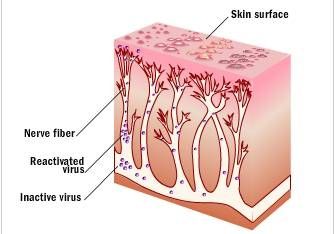The varicella zoster virus is notorious for causing chickenpox, that disease characterized by itchy rashes that appear all over the body. But do you know that this virus also causes another disease called shingles? Also called herpes zoster, the ailment affects an average of 1 million people in the United States alone.
While shingles usually occur once in most people, there are some cases when patients develop recurring cases of this ailment. And unlike chickenpox which is common among kids under 12 years of age, it is more common in older individuals.
Symptoms
 The most evident symptom of shingles, rashes, usually appears after several days of burning or stinging sensation in the affected area. Then the rash becomes more prominent with a band-like pattern. It often affects just one side of the body. It then develops into a group of small red blisters, similar to chickenpox. Then the blisters break often and dry over time.
The most evident symptom of shingles, rashes, usually appears after several days of burning or stinging sensation in the affected area. Then the rash becomes more prominent with a band-like pattern. It often affects just one side of the body. It then develops into a group of small red blisters, similar to chickenpox. Then the blisters break often and dry over time.
People with shingles complain of flu-like symptoms such as headache, high fever, nausea, body aches, and swollen lymph glands. Those who have had chickenpox will eventually have shingles later on in their lives. The varicella zoster virus remains dormant in the nerve cells of the body and will reactivate years later. As to why this virus gets reactivated is still unclear to scientists. The virus will then travel along the nerve paths and this will trigger shingles. Age is one of the risk factors of this ailment. This is believed to be due to the declining immunity brought about by the increase in age. It is estimated that half of all shingles cases happen to adults who are 60 years or older.
Link to Stroke, Heart Disease
If you have experienced shingles before you reached the age of 40, then you could be at greater risk for stroke and heart disease. According to web-based medical publication Counsel & Heal, a recent study found out that individuals who had shingles before reaching their 40th birthday were 50 percent more likely to suffer from a heart attack. The said research also discovered that participants who have had shingles were 74 percent more at risk of stroke compared to those who did not have the said disease. If you have had shingles before your 40th birthday, then you should be tested for heart and stroke risk factors.
Treatment and Prevention
Doctors usually prescribe painkillers to ease the pain caused by this disease. Painkillers may range from paracetamol, antidepressants, opioids, anticonvulsants and non-steroidal anti-inflammatory drugs. Lyrica, with the generic name pregabalin, is also prescribed for pain related to shingles. This drug is approved by the US Food and Drug Administration for this purpose. Lyrica works on overactive or damaged nerves believed to be causing nerve pain.
Studies involving animal subjects suggest that this drug lessens the electrical signals that are being transmitted by the damaged nerves.If you have never had chickenpox and you don’t want to get the varicella zoster virus, you can receive the varicella vaccine to avoid getting chickenpox and shingles. If you have had chickenpox and you fear that you may eventually get shingles, ask your doctor about the shingles vaccine called Zostavax.
Share This